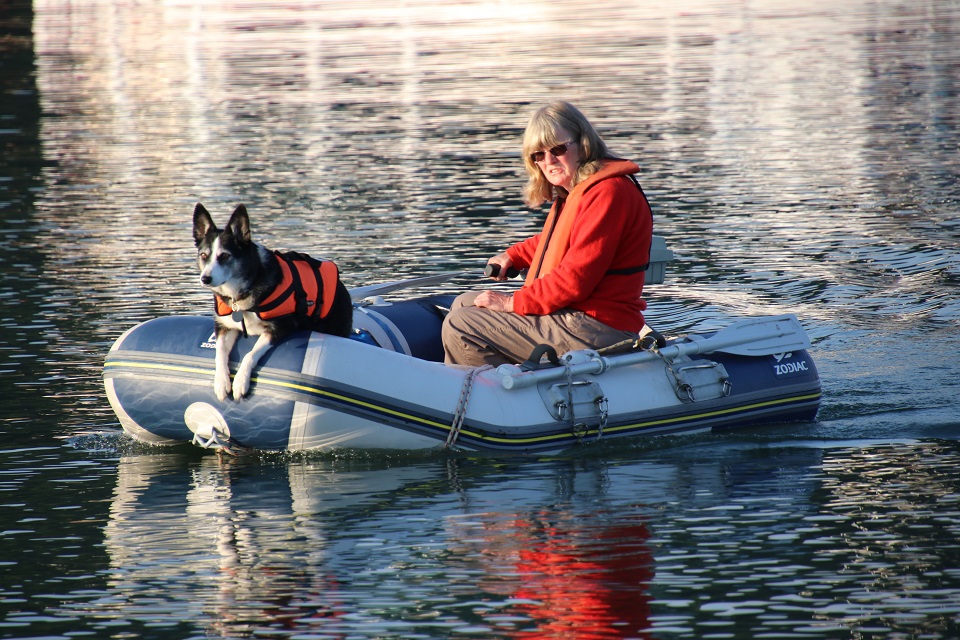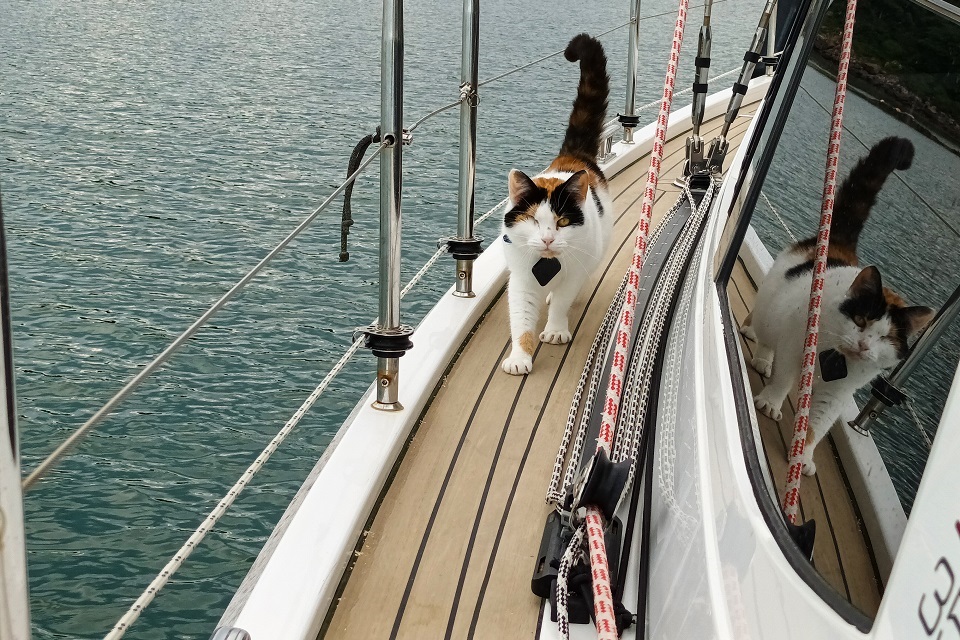Following the announcement by the Prime Minister on 19 May 2025, a new deal between the EU and the UK will include the re-introduction of EU pet passports. This should mean that for travel between the EU and the UK you can apply for a lifelong pet passport, rather than a one-off Animal Health Certificate. There are currently no more details or timescales for the change.
There may also be further changes to the Pet Travel Document for Northern Ireland.
RATS will endeavour to keep this page updated as more information becomes available and will publish news and updates in the CA Newsletter and Cruising magazine.
The latest information can also be found on the UK Government website here.
NOTE: This page is based on government advice. However, text in italics is based on experience not formal government advice. The regulations refer to Travellers Point of Entry (TPE) where elsewhere on the CA website there is reference to Points of Entry (PoE or PPF). The distinction is that TPEs are designated ports where Pets can enter while PoEs are where people and goods can enter. Mostly in France they are the same place but you should always check well in advance that your chosen port will allow you to enter with your pet.
Taking your pet with you can increase your enjoyment of cruising. Pets get to come on holiday with you with the advantage that there are no kennel or cattery fees to worry about. They're great company and dogs make great walking companions when you get to your destinations.
However, the rules and regulations of travelling with pets are very complex.
This table summarises the requirements, but you should read the details below.

Click/tap on the following for:
Travelling between GB, Isle of Man and the Channel Islands
Arriving in the EU from GB or a Third Country
Travel to Ireland and Northern Ireland from GB
Travelling to Finland, Republic of Ireland, NI, Norway, Malta and return to GB – Tapeworm treatment

Travelling between Great Britain, Isle of Man and the Channel Islands
The good news is, if you're travelling with your pet between Great Britain (Scotland, England and Wales), the Isle of Man, the Channel Islands, or you are entering GB from Northern Ireland there are no pet documents or health requirements for travel. You do not need to use an approved route (ie. ferry or air route) and you can take your pet on your private boat with you.
There is one exception in that from 4 June 2025, if you're taking your pet from GB to Northern Ireland, you will need a simple pet travel document issued, free of charge, by the Animal and Plant Health Agency (APHA). See details in the Northern Ireland section below.
Arriving in the EU
On arrival in the EU pet owners travelling with pets will need to enter through a designated Travellers’ Point of Entry (TPE).
Entry into Northern Ireland (NI) is regarded as entry into the EU under the withdrawal agreement but will be subject to special rules for travel from GB to NI under the Windsor Agreement.
An EU pet passport issued in GB has not been valid for travel to the EU or NI since 1 January 2021. GB can no longer issue EU Pet Passports but NI can still issue Pet Passports and these are valid for travel to the EU.
EU (excluding NI from GB)
Before your dog, cat or ferret can travel to the EU, you’ll need to take the following steps.
- You will need an animal health certificate (AHC) instead of a pet passport unless you have a valid EU pet passport issued in the EU. An AHC is valid for only a single journey of not more than 4 months duration (and typically costs more!).
- You must have your pet microchipped.
- Your pet must be vaccinated against rabies – your pet must be at least 12 weeks old before it can be vaccinated.
- You must wait 21 days after the primary rabies vaccination before travel.
- You must visit your vet to get an AHC for your pet no more than 10 days before travel to the EU.
As long as you keep your pet’s rabies vaccinations up to date, you will not need to get repeat vaccinations for repeat trips to the EU.
Getting an animal health certificate (AHC)
You must take proof of:
- your pet’s microchipping date
- your pet’s vaccination history
Your pet’s AHC will be valid for:
- 10 days after the date of issue for entry into the EU or NI
- onward travel within the EU or NI for 4 months after the date of issue
- re-entry to GB for 4 months after the date of issue


Most vets can issue an AHC but it needs to be signed by an 'official vet' which may be only certain vets in a practice. Check with your vet that they can issue AHCs for pets.
If you need to get the AHC from another vet on your journey, perhaps because you plan your crossing more than 10 days after leaving home, then be aware that the process of getting an AHC may take longer than from your own vet. This is because the other vet is likely to want to obtain a copy of your pet’s medical records from your own vet at home. You are advised to contact the vet you plan to get the AHC from at least two weeks before you require it.
If you do not have a record of your pet’s microchip details they should be available on line from a number of registration databases see the UK Government web page here.) Note If you don’t know which database your pet is registered on (or indeed if it is registered) then most of the databases have the facility to trace which database your pet is on by simply entering the microchip number.
Entering the EU on your own boat with a Pet
You may take your pet to the EU on your own boat but must enter through a TPE.
Most direct experience to date is via France because it is the nearest EU country. Details of TPEs for Northern France are given on the RATS France Country Pages
You should email the douane at your chosen port of entry to ask what they require. Typically, they will ask you to email copies of the Animal Health Certificate, Vaccination record and Microchip Certificate 24 hrs before arrival.
On arrival you will need to visit the Police Aux Frontiere to get your passports stamped and clear the formalities for the pet, but experience is that they are not likely to be interested if you have sent all the details in advance.
Travel to Ireland and Northern Ireland from GB
Northern Ireland
The Windsor Framework was implemented on 4 June 2025. This provides for microchipped pets, normally resident in GB, to travel from GB to NI with a life-long ‘pet travel document’, issued free by the Animal and Plant Health Agency (APHA). You must sign a declaration that you will not travel on into the Republic of Ireland or other EU country. Note applications opened in April 2025 and documents will usually be issued in 5 working days. Further details at New NI Pet Travel Scheme.
Ireland
In the case of Ireland the only Travellers’ Points of Entry are again Commercial Ferry terminals with no facilities for yachts and so it looks as if the only legal way round this is to travel with the pet separately by ferry although how assiduously this will be policed for yachts from GB is a matter of speculation.
Travelling to Finland, Republic of Ireland, NI, Norway, Malta and return to GB – Tapeworm treatment
If you’re travelling with your dog directly to Finland, Republic of Ireland, NI, Norway or Malta, it must have treatment against tapeworm (Echinococcus multilocularis). Your dog will need to receive treatment 1 to 5 days before arriving in any of these countries. Your vet must enter full details on the AHC following treatment.
If you are cruising in your own boat and entering any of the countries noted above from another country en route, you will need to get the tapeworm treatment in the 5 days before arrival, probably in your last port of call.
Returning to Great Britain
There has been no change to the current health requirements for pets entering GB post 1 January 2021.
Your pet must have one of the following documents when returning to GB from the EU:
- an EU pet passport (including those issued in GB before 1 January 2021), or a pet passport from a Part 1 listed third country
- the AHC issued in GB used to travel to the EU – which you can use up to 4 months after it was issued
- a GB pet health certificate (for travel into GB only) eg. Where you have exceeded the 4 months validity of the AHC.
- These documents must record that your pet meets the same requirements as those required for travel to the EU plus your dog must have had treatment against tapeworm (Echinococcus multilocularis). Your dog will need to receive this treatment 1 to 5 days before arriving in the UK and details entered onto the AHC or Pet Passport by a Vet.
Your pet will not need this documentation if it’s entering GB direct from:
- NI
- the Channel Islands
- the Isle of Man
Check the routes before you travel. You must travel using approved ferry or air routes. Your pet’s documents and microchip will be checked when entering GB. Most ferry operators to France do not allow pets unless taken onboard in a vehicle – DFDS do allow dogs with a foot passenger on the Newhaven - Dieppe route and some other routes but check if there are any additional restrictions.
It is not permissible to bring your pet back to the UK on board your own boat.
You do not have to travel on an approved route if you travel to GB from:
- other UK countries
- the Channel Islands
- the Isle of Man
- the Republic of Ireland
Pet travel helpline
Contact the Animal and Plant Health Agency’s (APHA) pet travel helpline:
Email: pettravel@apha.gov.uk
Telephone: 0370 241 1710 Monday to Friday, 8:30am to 5pm (closed on bank holidays)
This information came from the UK Government website and it would be wise to check on this if you intend to travel to Europe with your pet and to consult your own vet in plenty of time.
The Regulatory & Technical Services group (RATS) is an executive committee of the Cruising Association (CA) made up of CA volunteers. RATS gives advice and assistance to CA members and others on a voluntary basis but this is subject to the following Disclaimer and should not be regarded as a substitute for appropriate professional advice.
Disclaimer: Any advice has been prepared voluntarily by the Cruising Association, its members and others and they and it have tried to ensure that the contents are accurate. However, the Cruising Association, its employees, contributors and relevant members shall not be liable for any loss, damage or inconvenience of any kind howsoever arising in connection with the use of and/or reliance on such advice, save to the extent required by applicable law.
